







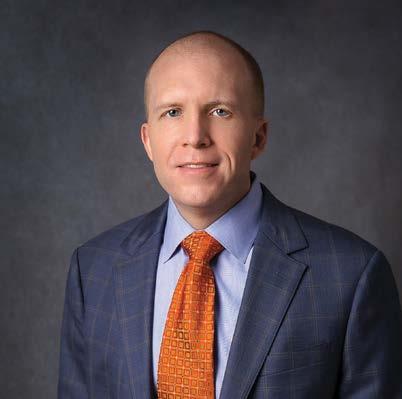


“We strive for excellence in our research, our curriculum, and our service to learners because what we do here can make the world better.”


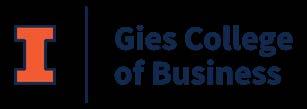

When I was honored as the Irwin Jecha Distinguished Professor in Accountancy last fall, I had a lot of people to thank: my family, my friends, my colleagues, my mentors, former students, and the donor who established the professorship. As I stood before an auditorium full of people to receive my medallion, I was moved by the physical presence of so many who helped me achieve this





As we take pride in the innovation and progress led by our department – as well we should – we have always been the force sustaining the forward motion of our institution.

Our students commit themselves to scholarly pursuits in hopes of bettering themselves and the world around them. Our faculty members log countless hours of research and professional development to bring new, relevant knowledge to our learners.
Our staff members connect our teaching and learning communities with critical resources, often while navigating complex and evolving standards of practice. And our alumni support nearly every aspect of this cycle through volunteerism, mentorship, and funding.
It can be hard to recognize an institution by the individuals who serve it – or by the individuals they serve. But that’s what we are: humans serving other humans.
We insist on excellence in all that we do, not so that we can etch our name onto a plaque, a statue, or a medal. We strive for excellence in our research, our curriculum, and our service to learners because what we do here can make the world better.
No matter how highly we rank among our peers or how many awards we can boast, the evidence of our excellence exists in the stories and experiences of people whose lives have been changed by the opportunities they received from our department.
It’s my great pleasure to present just a few of those stories to you.

Michael Donohoe
Head of the Department of Accountancy
Irwin Jecha Distinguished Professor in Accountancy
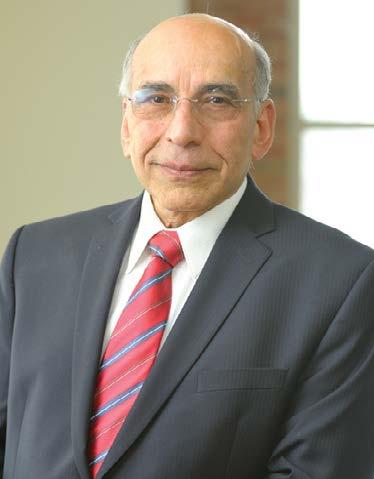

embedded derivatives that he hopes to finish soon.
Rashad Abdel-khalik, V.K. Zimmerman Professor in International Accounting, has been making valuable contributions to accounting research for five decades.
Abdel-khalik has a long history with the University of Illinois. He first came here as a PhD student in 1969, then returned for a yearlong fellowship as a visiting professor in the 1980s.
In 2000, he returned to Illinois once more, and it’s where he’s remained ever since.
As a scholar, Abdel-khalik is both prolific and wide-reaching. He’s produced many articles on accounting topics, often publishing in top journals. Much of his early research explored how different accounting methods could influence markets.
In 1994 a report from the US General Accounting Office (now called the General Accountability Office) changed the trajectory of his research completely. The report voiced concerns about how financial derivatives –forwards, futures, options, and swaps – could threaten the US economy.
Abdel-khalik said that when he first read the report, he did not know much about derivatives. The report worried him greatly, but that worry led to intrigue, and he dedicated himself to becoming more knowledgeable in the ways that companies use and report financial derivates to manage risk.
He’s since taught courses and written two books on the subject: Accounting for Risk, Hedging and Complex Contracts (Routledge) and BRAZEN: Big Banks, Swap Mania and the Fallout (World Scientific). He is currently writing a third book on accounting for
He is passionate about continuing to advocate for the development of accounting standards that can more accurately account for derivatives in financial reporting.
Beyond his own direct research contributions, Abdel-khalik has been responsible for nurturing and sustaining an important community of accounting scholarship.
When he joined the faculty at Gies Business in 2000, he became director of the Vernon K. Zimmerman Center for International Education and Research in Accounting.
The Center supports The International Journal of Accounting (TIJA), which has been an authoritative source of global accounting knowledge for 60 years. Drawing upon his previous editorial experience for The Accounting Review and the Journal of Accounting Literature, Abdel-khalik currently serves as the senior and managing editor for TIJA
According to him, journals of similar scope and prestige as TIJA tend to be newer. Decades of research published in TIJA provide a foundation for scholars today to build upon.
The Zimmerman Center also supports an annual research symposium, which was hosted on Illinois’ campus from 1967–2002. Under Abdel-khalik’s direction, the symposium transitioned to the global stage. Since 2003, the annual event has taken place jointly with other universities in different countries, spanning North America, Europe, and Asia.
Throughout his career, Abdel-khalik has contributed greatly to the quality and prominence of international accountancy research.
When asked the reason he’s remained dedicated to the Department of Accountancy at Illinois, he remarked on his gratitude for the support and opportunities he received when he first arrived here as a PhD candidate: “The department has been good to me,” he said.
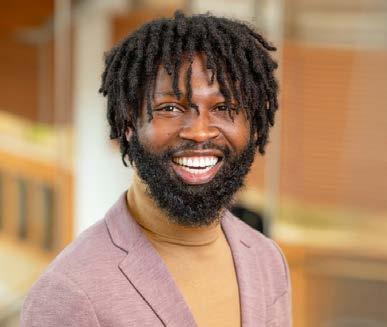
Isaac Yamoah, PhD candidate in accountancy, was named a 2025 Deloitte Foundation Doctoral Fellow, a prestigious honor awarded to top accounting doctoral students since 1956. A maximum of 10 doctoral students are selected to receive this recognition each year.

Master of Accounting Science (MAS) student Nick Rozmus has his eyes set on a career in Washington, DC. He wants to take his accounting expertise to agencies tasked with rooting out and stopping financial crime.
While determining his post-graduation plans, he’s thinking about roles in the US Department of Justice and US Department of State. He’s particularly interested in serving the Financial Crimes Enforcement Network, part of the US Treasury.
Fighting fraud and financial crime is something Rozmus is passionate about because he wants to help people most vulnerable to their impact.
“I come from a public service family,” said Rozmus, whose great uncle and two grandfathers held careers in military service. He said that growing up, his parents emphasized the value of volunteer work and instilled in him a deep respect and appreciation for helping others.
Rozmus sees accounting as a means of carrying out his passion for service. In his final year of undergraduate studies, he used his business knowledge to help a mobile food pantry as part of a class project. He has also been involved with the Gies Business Volunteer Income Tax Assistance (VITA) program for two years, helping community members in need file their tax returns.
He said that by applying – and growing – his expertise in accounting standards, taxation, and financial analysis, he believes he can better identify occurrences of financial crimes and help world governments develop more effective measures to prevent them.
Though he’s aware of the obstacles he might face in this arena, Rozmus has never been one to back away from a challenge. This past fall, he applied and interviewed for
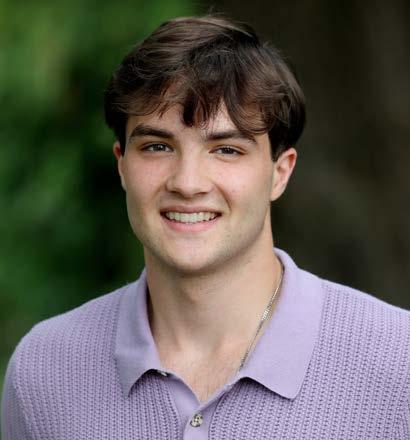
“My view is, if you think something’s important, even if you’re probably going to fail, you should just go for it.”
NICK ROZMUS (ACCY ’24, MAS ’25)
the highly prestigious Rhodes Scholarship, a postgraduate award that enables young people from around the world to study at the University of Oxford.
In November 2024, Rozmus was named a finalist for the 2025 Rhodes Scholar cohort. Although he ultimately did not receive the scholarship, he walked away from the experience extremely proud to have made it as far as he did.
“Very few of the past winners have come from a business background, and in recent years, few came from public schools,” Rozmus said. Among his region’s cohort, Rozmus was the only finalist with a degree in business.
Though he acknowledged the odds may not have been in his favor, he felt the opportunity was too valuable to let it pass by.
“My view is, if you think something’s important, even if you’re probably going to fail, you should just go for it,” he said.
As for the challenges he’ll face throughout the remainder of his career, he believes his time at Gies Business has prepared him to rise to the occasion. Given technological advancement and the transnational nature of most financial crime, he views adaptiveness to new technology and skills in diplomacy as critical to fighting financial crime on a global front.
Rozmus said that building those specific skills was embedded in the accounting curriculum at Gies Business by default.
He also felt that there was room to tailor his accounting degrees even more specifically to his goals. His undergraduate minor in international business enhanced his cross-cultural awareness, and his MAS concentration in information technology control has given him an even deeper understanding of the ways technology can be leveraged for nefarious activities.
Even when the College didn’t offer an opportunity he was interested in directly, its program requirements were adaptive enough so as not to restrict him from pursuing additional credentials.
“I also had a global security certificate, which wasn’t a part of Gies, but I had the flexibility to add it.”
But underlying all the practical knowledge he’s gained is that initial passion for helping others. Rozmus said that the ability to explore and participate in public service during his studies has been invaluable.
He said that many people at Gies Business – professors, teaching assistants, and advisors – went out of their way to help him identify career paths and volunteer opportunities based on his values.
“I really felt like ‘business on purpose’ is real at Gies,” Rozmus said.

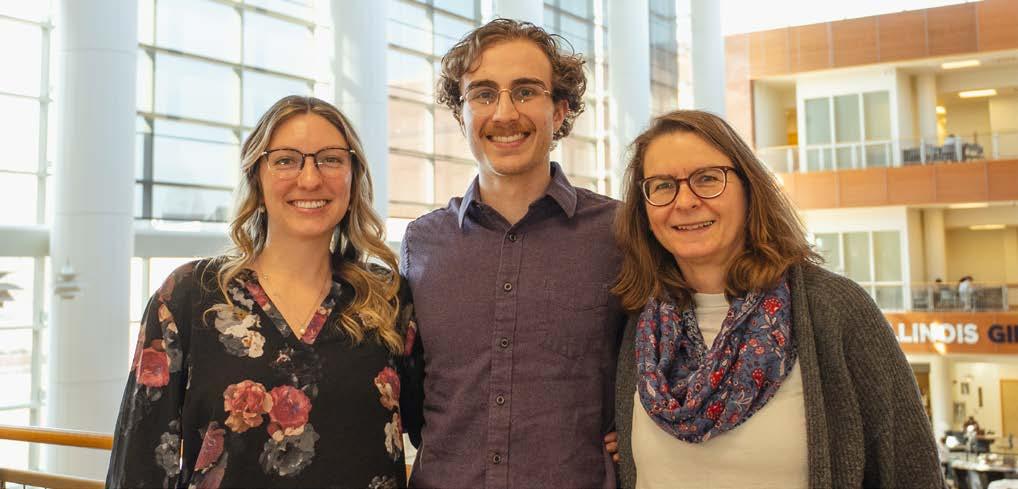
Academic advisors play an important role in the student experience at Gies Business. They help learners connect with important resources and navigate curriculum requirements to meet their academic goals.
Conny Hauf, Riley Mueller, and Shelby Charleston – the three academic advisors that currently make up the accountancy advising team – serve more than 900 students enrolled in the Bachelor of Science in Accountancy, Bachelor of Science in Accountancy + Data Science, and Master of Accountancy Science programs.
Hauf, Mueller, and Charleston help learners determine the courses they should take and when they should take them. To help students build effective academic plans, the advisors often must help students identify their goals.
“A big part of our role is shifting students’ focus to beyond academics and beyond their time at Gies Business,” said Mueller.
When crafting course plans, advisors will factor in graduation requirements for a chosen major (or majors), but they also need to consider whether a student will participate in study abroad programs, cocurricular opportunities, or professional development.
Hauf noted that sometimes learners can be so focused on academic performance that they haven’t considered other opportunities available to them. She makes a point to check in with learners about their overall wellness, helping them see the value of participating
in registered student organizations (RSOs), completing an internship, or even just taking more advantage of social events.
“I remind them that when they enter the job market, one of the things employers also look for is that they bring a little bit of experience,” said Hauf.
Students at Gies Business come from a wide variety of cultural and educational backgrounds, which can influence the pain points they may experience as they adapt to college life. When students are wrestling with an important decision or feeling stuck, the advising office is often one of the first places they turn to for help.
“A lot of students just aren’t aware of how many resources we have,” said Charleston. “We’re bridging the gap between them and all the resources that they don’t even know to seek out.”
As one example, a student might approach an advisor about adding a second major or changing some part of their academic plan. When the advisor inquires about the reason why, it becomes evident that the student is concerned about job security after graduation. The advisor might then refer them to the Office of Career and Professional Development, where they can get more information about career paths for their major and receive additional guidance about job seeking. After talking with a career counselor, the student may or may not decide
“A lot of students just aren’t aware of how many resources we have. We’re
bridging the gap between them and all the resources that they don’t even know to seek out.”
SHELBY CHARLESTON
to make changes to their academic plan, but whatever decision they make will be a better informed one.
For accounting students specifically, a major part of any professional development discussion centers on CPA eligibility. Because the process of becoming CPA eligible can be complicated, the accountancy department’s advisors serve as a primary resource for learners to better understand those requirements – and stay on track to complete them.
The care, patience, and flexibility demanded by an academic advising role doesn’t always make for an easy job, but the accountancy advisors all agree that the work is fulfilling.
For Hauf, it’s the team camaraderie. She appreciates working alongside knowledgeable and dedicated colleagues who support each other. Charleston loves to see the immediate impact she can have when helping students.
Mueller’s most rewarding moments come after helping students recover from unforeseen obstacles or a perceived failure.
“I feel really happy that I was there to listen to them in this very stressful moment, but also to go that next step and say ‘There is a path forward, here are your options, and you’re going to choose the one that’s going to be right for you. But I am going to be here in case you still need it.’”

When Arla Lach (ACCY ’99) was in high school, her mother worked in the front office of a family-owned manufacturing company. The same summer the company implemented their first computer system and began converting their paper records to digital ones, they hired Lach for a part-time summer job entering data.
While she was there, the company’s auditor came in to prepare financial statements. Lach got to talking to him about his work.
“I’ll never forget that conversation I had with him about all the options that accounting and public accounting provide from a career path perspective,” she said.
For Lach, who was weighing her options about colleges, majors, and potential careers, it was an impactful conversation that opened her eyes to the expansive opportunities accounting could offer.
“I loved the optionality of working for a big public accounting firm, working in industries, or starting my own business – all these different options – at a point in my in my life when I didn’t really know what I wanted to do.”
Lach is a first-generation college graduate, but University of Illinois Urbana-Champaign had been on her radar for a while. Her grandparents were longtime fans of Illini athletics. And Illinois just so happened to be home to the top accountancy program.
“I always look on my time at the University of Illinois very fondly,” said Lach.
Lach began the accounting program shortly after the rollout of Project Discovery, a cutting-edge accounting curriculum of its time, which placed significant emphasis on group work.

“When you’re going through it, it’s challenging,” Lach recalled. “But it was such a valuable experience to get that, because everything that I do in my career is in teams. There’s next to nothing that I do all on my own.”

After graduation, she started her career at Grant Thornton, where she’s remained ever since. In 2013, she was named a partner at the firm. She is currently a partner in the audit and assurance practice in the Chicago office. She previously served as the market managing principal for that office, becoming the first woman to lead Grant Thornton’s headquarters.
“It seems like such a lofty goal, when you start your career in public accounting – to get to achieve that,” said Lach. She hadn’t exactly planned to spend more than two decades at Grant Thornton. But then she found that at every level she advanced, she was continuing to be challenged and was learning something new.
“I was surrounded by incredibly intelligent people and clients and kept getting different and new opportunities to develop my skill set. So I ended up staying,” said Lach. “That achievement of making partner was definitely a significant milestone in my leadership journey.”
Lach’s leadership journey also includes several board positions that keep her engaged with her community in impactful ways.
“I’ve always been interested in trying to give back to the community and use my skills to help those organizations that help others.”
In her first board appointment, she served Theater Building Chicago, an incubator of new musicals in the Chicago area. Later, she joined the board of Step Up Women’s Network, an organization that connects young girls and women with professional mentorship.
Lach is proud that her accounting and finance knowledge allow her to contribute to service organizations. But she also appreciates

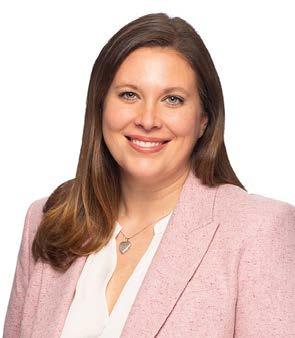
“I loved the optionality of working for a big public accounting firm, working in industries, or starting my own business – all these different options – at a point in my in my life when I didn’t really know what I wanted to do.”
ARLA LACH (ACCY ’99)
substance use disorder treatment and works to reduce prison recidivism.
“I’ve been on that board for nine years, learning about the healthcare environment and the prison system,” she said. “I’ve gotten so much more out of it than I ever expected.”
With all she’s gained from her career, Lach now tries to pay it forward. Like the company auditor who gave her some lifechanging advice all those summers ago, she now hopes that sharing her experience can help inspire others to recognize the breadth of opportunities that exist in the accounting profession.
Throughout her career, Lach has returned to Illinois’ campus to participate in career fairs and speak in classrooms. She also serves on the advisory board of the Department of Accountancy
(2022)
“I enjoy being able to give back to the school that gave me a great foundation in my career,” said Lach.












